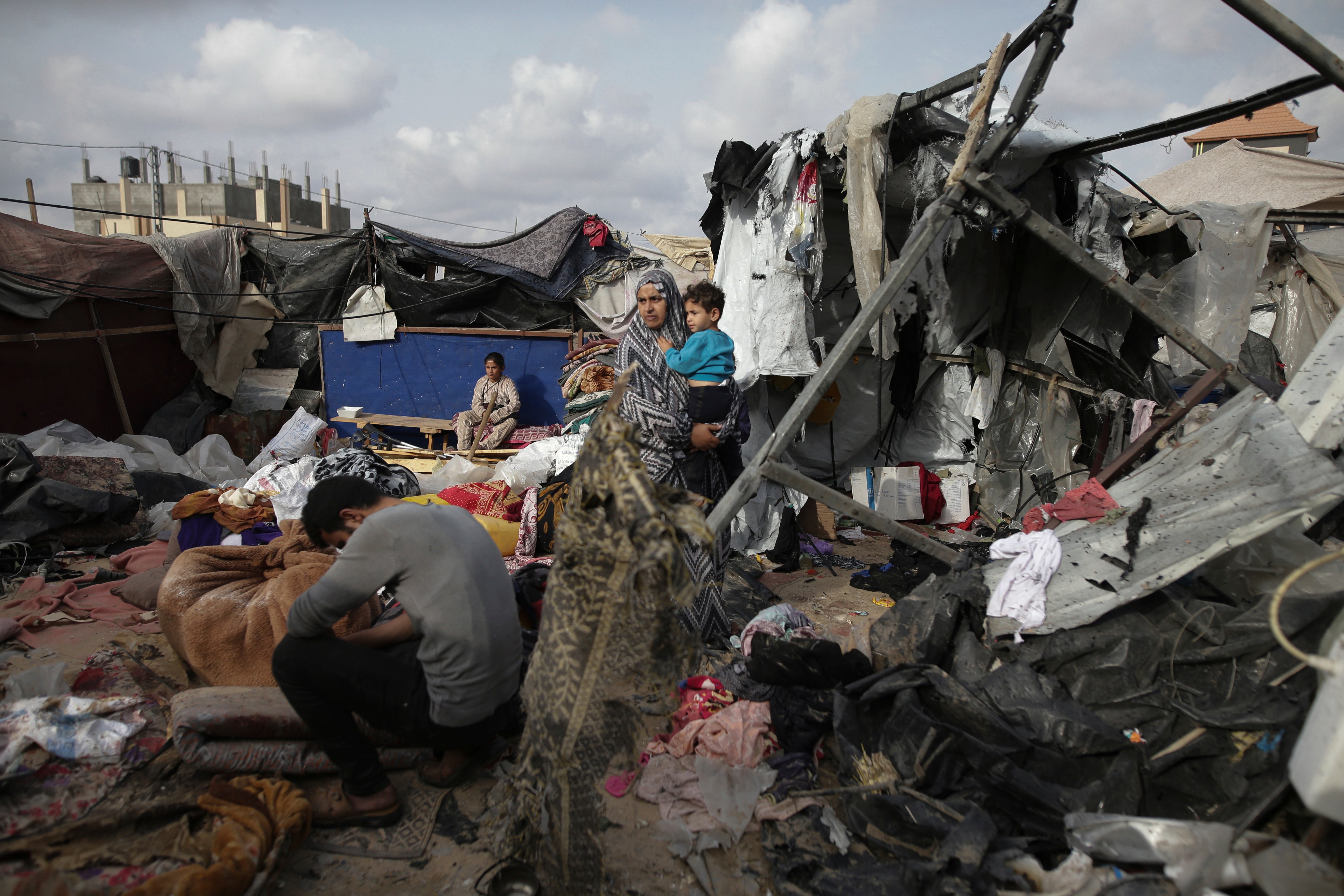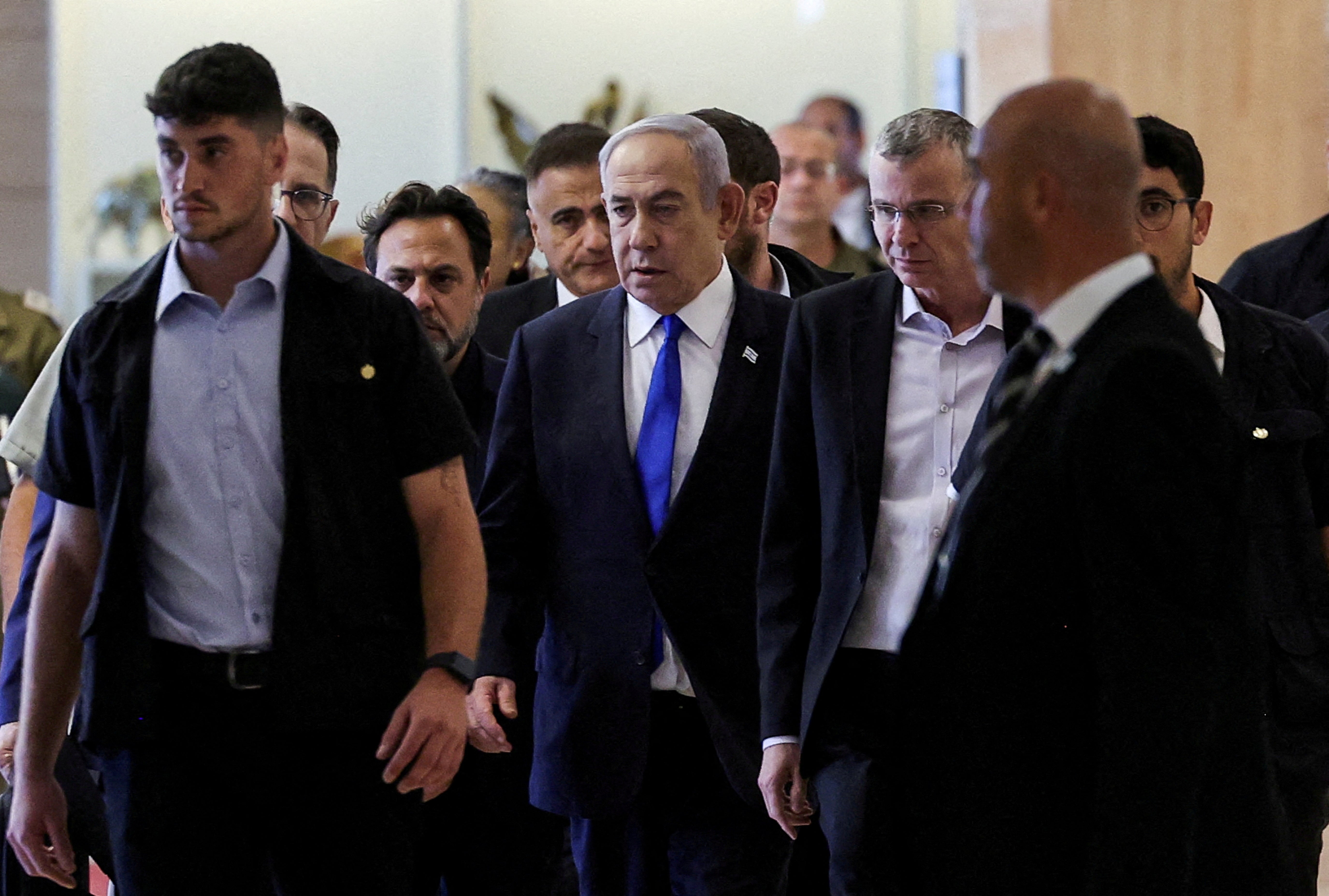Israeli prime minister Benjamin Netanyahu has insisted there will be no permanent ceasefire in Gaza until Hamas is destroyed – undermining Joe Biden’s announcement of a new ceasefire proposal.
His comments came in the wake of a dramatic intervention by the US president in laying out the proposal for a three-phase deal to bring about a ceasefire in the Gaza Strip in exchange for Hamas releasing hostages. The families of Israeli hostages called for all parties to immediately accept the proposal.
“Israel’s conditions for ending the war have not changed: The destruction of Hamas military and governing capabilities, the freeing of all hostages and ensuring that Gaza no longer poses a threat to Israel,” Mr Netanyahu said.
“Israel will continue to insist these conditions are met before a permanent ceasefire is put in place. The notion that Israel will agree to a permanent ceasefire before these conditions are fulfilled is a non-starter,” he added.

Benny Gantz, a centrist former general who joined Mr Netanyahu in an emergency coalition, has threatened to bolt this week if the prime minister does not form a Gaza “day-after” plan with him.
But in a possible sign that that could be deferred, Mr Gantz on Saturday voiced appreciation for Mr Biden and called for the Israeli war cabinet to be convened “to decide the next steps”.
Israel’s war in Gaza was triggered by a Hamas attack inside Israel on 7 October, during which around 1,100 people were killed and another 250 were taken into Gaza as hostages. More than 36,000 Palestinians have been killed in the subsequent Israeli bombardment, according to health officials in the Hamas-run territory.
Mr Biden had outlined the plan on Friday, saying that Hamas is “no longer capable” of carrying out another large-scale attack on Israel. He urged Israel and Hamas to reach an agreement to release about 100 remaining hostages, along with the bodies of around 30 more, for an extended ceasefire.
David Cameron, the UK foreign secretary, urged Hamas to accept the proposal. “As we’ve long argued, a stop in the fighting can be turned into a permanent peace if we are all prepared to take the right steps. Let’s seize this moment and bring this conflict to an end,” he said. On Saturday, prime minister Rishi Sunak called the proposal “welcome news” and said The UK could “flood Gaza with far more aid” if the deal is accepted.

Hamas said it viewed the proposal presented by Mr Biden “positively” and called on the Israelis to declare explicit commitment to an agreement that includes a permanent ceasefire, a complete withdrawal of Israeli troops from Gaza, a hostage exchange and other conditions.
Ceasefire talks ground to a halt last month after a major push by the US and other mediators to secure a deal in the hope of averting a full Israeli invasion of Gaza’s southern city of Rafah. Israel says the Rafah operation is vital to uprooting Hamas fighters.
Israel on Friday confirmed its troops were operating in central parts of the city. The ground assault has led to an exodus of around 1 million Palestinians out of the city and has thrown UN humanitarian operations based in the area into turmoil.
Speaking from the White House on Friday, Mr Biden said the “comprehensive” proposal has been offered by Israel to Hamas negotiators after months of painstaking and “intensive diplomacy” efforts, carried out by US negotiators in conjunction with Israeli, Qatari, Egyptian and other Middle Eastern representatives. However, Mr Netanyahu’s remarks cast doubt on his commitment to the plan.
Israeli opposition leader Yair Lapid urged Mr Netanyahu to agree to the deal, saying his party would support it even if ultranationalist factions in the governing coalition rebelled. Mr Netanyahu has faced increasing pressure from hardline ministers to keep pushing Israeli’s military offensive in Gaza. Mr Lapid’s pledge meant a deal would probably pass in parliament.
“The government of Israel cannot ignore president Biden’s consequential speech. There is a deal on the table and it should be made,” Mr Lapid said in a social media post on Saturday.
Mr Biden said the proposal would involve three distinct phases: a six-week “full and complete ceasefire” including “withdrawal of Israeli forces from all populated areas of Gaza, the release of a number of hostages including women, the elderly, [and] the wounded” and the release of “hundreds of Palestinian prisoners” by Israel.
“Palestinian civilians would return to their homes and neighborhoods in all areas of Gaza, including in the north,” Mr Biden said.
The first phase would also see a “surge” of humanitarian assistance to the tune of 600 aid trucks passing into Gaza per day during the ceasefire period, and thousands of temporary shelters delivered by the international community to support housing needs for Gaza residents whose homes have been destroyed during the conflict.
“All that and more would begin immediately,” Mr Biden added.

The second phase would include the release of all remaining living hostages, including male soldiers, and Israeli forces would withdraw from Gaza. The third phase calls for the start of a major reconstruction of Gaza, which faces decades of rebuilding from devastation caused by the war.
The negotiations came after what the families of hostage said was an aggressive meeting on Thursday with Israel’s national security adviser, Tzachi Hanegbi, who told them that the government wasn’t ready to sign a deal to bring all of the hostages home and that there was no plan B.
Mr Hanegbi said this week he expects the war to drag on for another seven months, in order to destroy the military and governing capabilities of Hamas and the smaller Islamic Jihad militant group.
However, Mr Netanyahu has promised a “total victory” that would remove Hamas from power, dismantle its military structure and return the hostages, and on Saturday, the government said its conditions for ending the war have not changed.
Many hostage families blame the government’s lack of will to secure a deal for the deaths of many of the hostages in captivity.
“We know that the government of Israel has done an awful lot to delay reaching a deal and that has cost the lives of many people who survived in captivity for weeks and weeks and months and months. Our hearts are broken by the amount of people we will receive that are no longer alive,” Sharone Lipschitz told Associated Press. Her mother Yocheved was freed in the November ceasefire, and her father Oded is still in captivity.
Additional reporting by agencies

